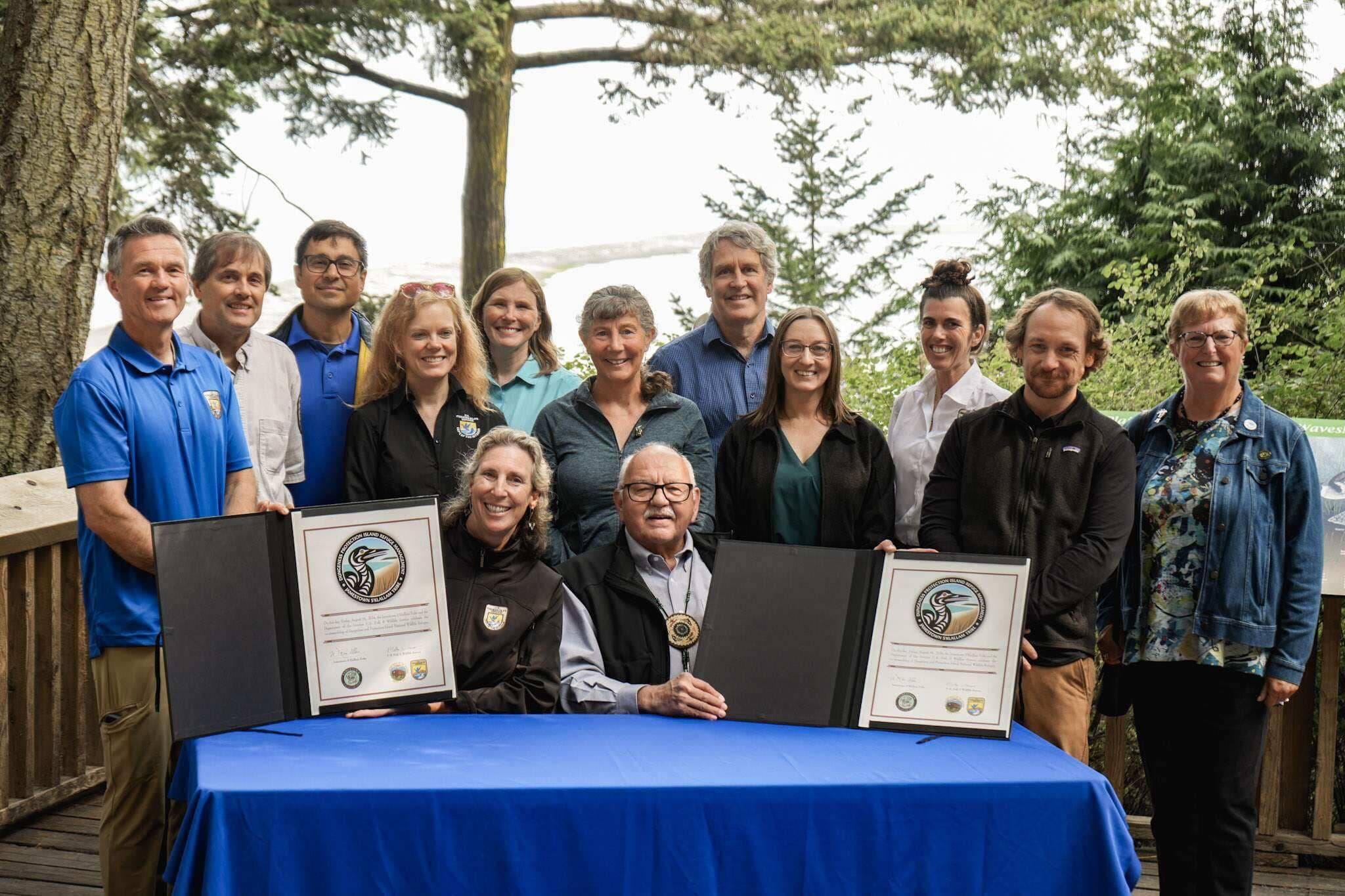SEQUIM — The Jamestown S’Klallam Tribe and U.S. Fish and Wildlife Service announced a co-stewardship agreement for the Dungeness and Protection Island National Wildlife Refuges, with the Tribe taking over the day-to-day management of the refuges.
The Tribe will follow purposes, goals and objectives laid out in the Comprehensive Conservation Plans for the Dungeness and Protection Island National Wildlife Refuges, tribe representatives noted in a press release, including habitat, wildlife and cultural resource management, visitor services, county and state partnerships and volunteer opportunities along with the Dungeness National Wildlife Refuge Friends group and other partners.
“Our Tribe has a strong historical and cultural relationship with the Dungeness and Protection Island National Refuges since our original village was sitting at the mouth of the Dungeness River,” Jamestown S’Klallam Tribal Chairman/CEO W. Ron Allen said in the statement. “This agreement recognizes our unique Tribal sovereignty and the government-to-government relationships and symbolizes how these relationships have evolved into a very sophisticated level in the 21st century.”
The agreement was signed on Aug. 16.
“This agreement is a significant milestone and demonstrates our commitment to foster co-stewardship opportunities that advance our shared interest in the conservation of these treasured natural and cultural resources for future generations,” said Martha Williams, U.S. Fish & Wildlife Service director.
Dungeness and Protection Island National Wildlife Refuges are part of the Washington Maritime National Wildlife Refuge Complex. According to the press release, the four current service employees will focus entirely on the other four refuges in the complex: Flattery Rocks, Quillayute Needles, Copalis and San Juan Islands National Wildlife Refuge.
Meanwhile, the Jamestown S’Klallam Tribe will staff the Dungeness and Protection Island refuges.
Portions of the Dungeness National Wildlife Refuge are closed to the public to protect wildlife, but others are open for a variety of public uses, tribe representatives said. The refuge has an active program of volunteers helping with public information, education, maintenance and wildlife protection.
Other refuge management activities include wildlife surveys, invasive species mitigation, public education and marine debris cleanup.
Protection Island National Wildlife Refuge provides some of the last remaining undeveloped habitat for many burrow-nesting seabirds in the Salish Sea. It will remain closed to the public to protect wildlife and the island’s resources.
The tribe’s interest in managing the refuges has drawn concern. A petition by the Clallam Freedom Alliance had drawn a little more than 600 signatures as of Sunday.
The petition reads, in part: “This decision could pave the way for oyster farming in the Dungeness Bay, drastically altering the landscape and the crystal clear views we’ve come to cherish. Oyster farming, while often seen as a sustainable source of seafood, can have potentially damaging effects on the environment.
“The commercialization of a wildlife refuge is a new concept. Many are leery that handing over management of our community spaces to a sovereign nation may put commercial ventures ahead of public interests. Although the Jamestown Tribe has benefited from appropriating Clallam County taxpayers’ money for its projects and enterprises, its intentions haven’t always been transparent.”
No further approvals were needed from the U.S. Fish and Wildlife Service for the Jamestown S’Klallam Tribe to resume aquaculture operation — a 50-acre oyster farm within portions of Dungeness Bay — on the state-leased portion of Dungeness National Wildlife Refuge, said Megan Nagel of the U.S. Fish & Wildlife’s Office of Communications.
“There are existing permits and leases with county, state and federal approvals that govern the project,” Nagel wrote in an email. “The Jamestown S’Klallam Tribe is currently operating their aquaculture facility.”
________
Michael Dashiell is the editor of the Sequim Gazette of the Olympic Peninsula News Group, which also is composed of other Sound Publishing newspapers Peninsula Daily News and Forks Forum. Reach him at michael.dashiell@sequimgazette.com.

